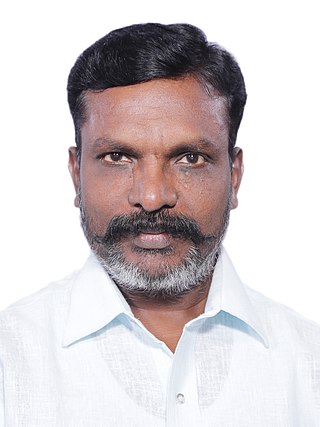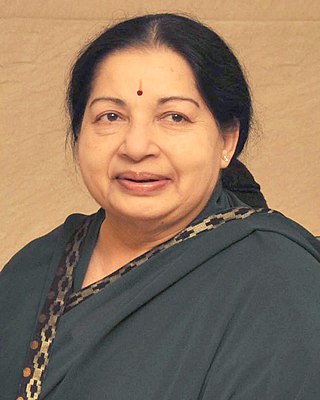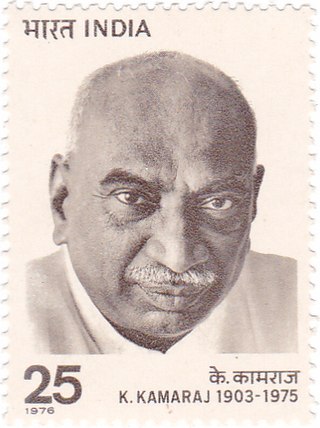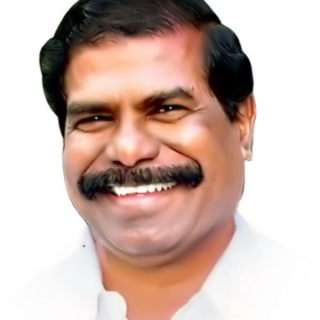Related Research Articles

The Dravida Munnetra Kazhagam is an Indian political party based in the state of Tamil Nadu, where it is currently the ruling party, and the union territory of Puducherry, where it is currently the main opposition.

Pattali Makkal Katchi is a political party in Tamil Nadu, India, founded by S. Ramadoss in 1989 for the Vanniyar caste in northern Tamil Nadu. It is a part of the BJP-led National Democratic Alliance (NDA). It appears that the party or candidate participated in elections using the "Elephant" symbol in the 1980s, and later adopted the "Ripe Mango" symbol in the 1990s.
Gounder is a title used by various communities in the Indian state of Tamil Nadu. It may refer to various unrelated communities such as Vettuva Gounder,Kongu Vellalar, Thuluva Vellalar, Urali Gounders, Kurumba, Vanniyars, Vokkaligas.

The Vanniyar, also spelled Vanniya, formerly known as the Palli, are a Dravidian community or jāti found in the northern part of the Indian state of Tamil Nadu.
Diwan Bahadur Agaram Subbarayalu Reddiar was a landlord and Prime Minister or Premier of Madras Presidency from 17 December 1920 to 11 July 1921.

Tholkappiyan Thirumavalavan, better known as Thol. Thirumavalavan is a political leader, scholar and activist from the southern Indian state of Tamil Nadu. He is a Member of Parliament from Chidambaram. Leader and President of Viduthalai Chiruthaigal Katchi. He rose to prominence in the 1990s as a bahujan leader, and formally entered politics in 1999. His political platform centres on ending caste-based discrimination and consequently the caste system. He has also expressed support for Tamil nationalist movements in Sri Lanka.

The tenth legislative assembly election of Tamil Nadu was held on 24 June 1991. The All India Anna Dravida Munnetra Kazhagam (AIADMK) – Indian National Congress (INC) alliance won the elections in a landslide and AIADMK general secretary J. Jayalalithaa became the chief minister. This was her first term in office. The united strength of AIADMK, the alliance with the Congress, and the wave of public sympathy in the wake of Rajiv Gandhi assassination combined to produce a massive victory for the AIADMK. The DMK could only win 2 seats. This was the worst performance of the DMK since it entered electoral politics in the 1957.

The fifth legislative assembly election of Tamil Nadu was held in March 1971. Dravida Munnetra Kazhagam was re-elected, after its first victory under the leadership of C N Annadurai in 1967. This was the first time M. Karunanidhi, contested as the leader of DMK party won the election, since he assumed Chief Ministership for the first time, after the death of C N Annadurai. Karunanidhi had emerged successfully in the leadership crisis (having supported by M. G. Ramachandran, against Nedunchezhiyan, which ensued after the death of C. N. Annadurai. The main opposition party in the election was Indian National Congress led by K. Kamaraj, whereas the Indian National Congress faction aligned with Dravida Munnetra Kazhagam.

The fourth legislative assembly election of Madras State was held in February 1967. The Dravida Munnetra Kazhagam (DMK) led coalition under the leadership of C.N. Annadurai won the election defeating the Indian National Congress (Congress). Anti-Hindi agitations, the rising prices of essential commodities, and a shortage of rice were the dominant issues. K. Kamaraj's resignation as the Chief Minister in 1963, to concentrate on party affairs, along with persistent rumors of corruption had weakened the incumbent Congress Government. This was the second time after Communist Party of India winning Kerala assembly elections in 1957, for a non-Congress party to gain the majority in a state in India, and the last time that Congress held power in Tamil Nadu. It was the first time a party or pre-election alliance formed a non-Congress government with an absolute majority. It marked the beginning of Dravidian dominance in the politics of Tamil Nadu. Annadurai, who became the first non-Congress chief minister of post-independence Tamil Nadu, died in office in 1969 and V.R. Nedunchezhiyan took over as acting chief minister.
M. Alagappa Manickavelu Naicker or simply, M. A. Manickavelu was an Indian politician of the Indian National Congress and founder of the Commonweal Party. He served as the Minister of Revenue for the Madras state from 1952 to 1962. He also served as a member of the Rajya Sabha from 1962 to 1964. During 1964-70 he was the Chairman of the Tamil Nadu Legislative Council.
S. S. Ramasami Padayatchiyar was a politician from the Indian state of Tamil Nadu. He was the founder of the Tamil political party Tamil Nadu Toilers' Party, which is considered to be a predecessor of Pattali Makkal Katchi.
Commonweal Party was an Indian political party that existed in Tamil Nadu between 1951 and 1954. It was started by M. A. Manickavelu Naicker and claimed to represent the interests of the Vanniyar caste. It merged with Indian National Congress in 1954. The party won three seats in the 1952 Lok Sabha election and six seats in the Madras State legislative assembly elections.

The first legislative assembly Election to the Madras state based on universal adult suffrage was held in 27 March 1952. This was the first election held in Madras state after the Indian Independence. This election was officially known as the 1951 Madras State Election, even though through delays, actual voting didn't take place until early 1952.

The third legislative assembly election to the Madras state was held on 21 February 1962. The Indian National Congress party, led by K. Kamaraj, won the election. Dravida Munnetra Kazhagam made significant in-roads in the election and emerged as the second party for the first time by winning 50 seats. 1962 Election remains the most recent election in which Indian National Congress to form a majority Government in the State as its support was heavily declined due to rise of Dravidian political parties.

Tambaram is a state assembly constituency in Chengalpattu district, Tamil Nadu, India. Its State Assembly Constituency number is 31. It includes All Wards from Zone 4 and Zone 5, Wards Comprising the rest of the areas other than Hashinapuram and Nemilichery in Zone 3 of Tambaram City Municipal Corporation and Agaramthen, Madurapakkam and Kovilanchery Villages in St.Thomas Mount Panchayat Union. It forms a part of Sriperumbudur Lok Sabha Constituency for national elections. It is one of the 234 State Legislative Assembly Constituencies in Tamil Nadu in India.

G. K. Mani is, as of 1998, the honary president of Pattali Makkal Katchi from 2022 completing more than 25 years as president of PMK party. G.K. Mani's name was proposed by PMK founder Dr. S. Ramadoss during the party's general body meeting in 1998 for President's post in PMK. Later the same year, he was elected by votes for the PMK's President.

Kaduvetti Guru, also known as J. Guru, was an Indian politician, who was twice elected as a Member of the Legislative Assembly in Tamil Nadu. He was the president of a caste organisation, the Vanniyar Sangam.
Reservation policy in Tamil Nadu is a system of affirmative action that provides historically disadvantaged groups representation in education and employment. Reservations in the state rose from 41 percent in 1954 to 69 percent in 1990.
T. G. Venkatraman was an Indian politician who was a member of the D.M.K. Party.
The 1987 Vanniyar reservation protest was week-long a protest organized by the Vanniyar Sangham headed by S. Ramadoss in Tamil Nadu in September 1987 demanding 20 percent reservation for Vanniyars in education and employment in the state and 2 percent in education and employment in the Union government. The agitation turned violent and destructive, the protestors damaged roadways and reportedly cut down lakhs of trees to block roadways, and destroyed public property. The activists of the Vanniyar Sangham attacked Dalit settlements and burned down more than 1,400 Dalit houses in numerous villages. At least 21 people were shot dead by the Tamil Nadu police sent to suppress the agitators.
References
- ↑ "Assembly Election Result 2016, Assembly Election Schedule Candidate List, Assembly Election Opinion/Exit Poll Latest News 2016". infoelections.com. Retrieved 6 November 2016.
- ↑ John L. Varianno; Jean-Luc Racine; Viramma Josianne Racine (1997). Viramma: life of an untouchable . Verso. p. 293. ISBN 978-1-85984-817-3.
- ↑ Lloyd I. Rudolph; Susanne Hoeber Rudolph (1984). The Modernity of Tradition. University Of Chicago Press. p. 55. ISBN 978-0-226-73137-7.
- ↑ Mirachandani, G. G. (2003). 320 Million Judges. Abhinav Publications. p. 30. ISBN 978-81-7017-061-7.